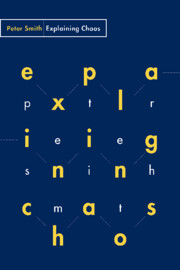3 - Intricacy and simplicity
Published online by Cambridge University Press: 22 September 2009
Summary
In the opening chapter, we saw that the chaotically complex behaviour in the paradigm Lorenz case is dictated by a ‘strange’ attractor with an infinitely intricate structure. In the following chapter, we were able to sharpen up that informal talk of infinite intricacy; the attractor, we said, is a fractal. We must now face the question which immediately arises. How can an infinitely intricate structure like this possibly play an essential part in a competent scientific account of some natural phenomenon? For by the lights of our own best physical theories, quantities such as fluid circulation velocity, temperature, the proportional concentration of a chemical in a mixture and so forth – that is, macroscopic quantities of the type dealt with in paradigm chaotic models like Lorenz's – cannot have indefinitely precise real number values. Hence their time evolutions cannot really exemplify infinitely intricate trajectories wrapping round a fractal attractor, any more than a coastline can exemplify a genuinely fractal pattern.
What is being claimed here is something much stronger than the trite epistemological point that there is a limit to the precision with which we can know facts about the values of physical quantities. The claim is that there is no fact of the matter about the exact values of quantities like circulation velocity. We know, for example, that fluids are gappy distributions of molecules in motion.
- Type
- Chapter
- Information
- Explaining Chaos , pp. 39 - 50Publisher: Cambridge University PressPrint publication year: 1998



